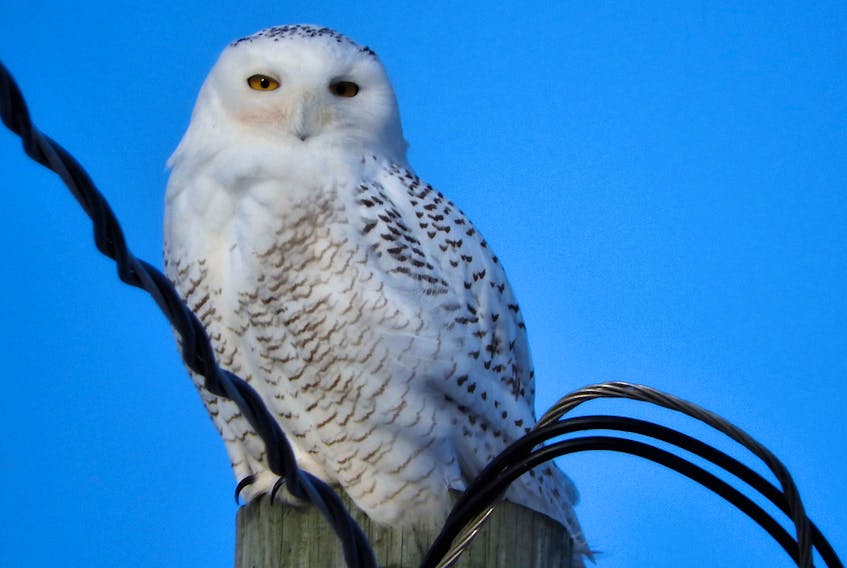A larger number of snowy owls have been sighted around rural P.E.I. this winter thanks to a stubby-legged rodent.
Donna Martin, a former resident of Summerside, has a sharp eye when it comes to capturing these elusive ghostlike owls in flight or freeze. She said the owls have travelled far-flung distances.
“What’s happening this year is that there was a bumper crop of lemmings. As a result of this increased food source, snowy owls will produce higher numbers of young. These young owls will then disperse, travelling long distances, looking for their own winter territories, and creating these irruptions of owls.”
Martin, a wildlife technician by trade, said: “The birds move in a southerly direction looking for a winter territory. Once they find their winter territory, then they will protect this area until they return home for breeding season.”
Adult males are almost all white, while females have more black barring as part of their plumage.
The large bird species is a ground nester that captures its own live food, and during breeding season they may only eat lemmings.
But when the owls disperse from their native territories, they will eat a variety of prey from small birds and mammals, including water birds, waterfowl, pigeons, partridge, to name a few so they are an opportunistic hunter.
Martin’s striking images capture the snowy owl perched on a pole or in full flight as it swoops low against the coastal dunes that appear somewhat similar to its native Artic tundra.
“I started doing photography just over two years ago. I did take photos before, but usually only of rare birds as a documentation shot. I am a birder first, so I go out and look at birds, document and list them in both a provincial and worldwide database (eBird), which uses the data to record trends and patterns.
“It’s a way to get out there and see what’s around, while keeping a close watch on birds that are endangered or vulnerable. I also volunteer with the Christmas Bird Count and Project Feeder Watch programs by Bird Studies Canada,” she said.

The snowy owl species won’t go much further south than southern Canada or the northern United States.
Martin, who travelled from Manitoba to Summerside for the winter, said that she admires the birds of prey from afar, and advises others to do the same.
“I’ve always been very conscientious about not disturbing these birds, and taking photos quickly. The biggest thing is to quietly approach, with the longest camera lens. Most of my photos are cropped, so I’m taking photos at a respectful distance or, often shooting from the car.”
Martin stressed that pet owners should keep their dogs on a leash when on the beach, to protect the wildlife and any endangered birds nesting.
“Biodiversity needs to be saved,” she said. “If I can raise awareness or change just one person’s outlook on birds, then I’m happy. There are so many people who drive by and never see anything, and they need to just open their eyes and see the beauty around them.”









